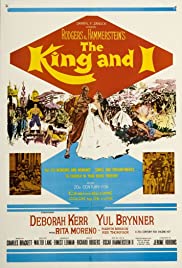
THE KING AND I
US, 1956, 133 minutes, Colour.
Deborah Kerr, Yul Brynner, Rita Moreno, Martin Benson, Rex Thompson, Alan Mowbray.
Directed by Walter Lang.
The King and I is one of the most popular of Rodgers and Hammerstein’s musical theatre plays. It was based on the story, Anna and the King of Siam, about the English governess, Anna Leonowens who came with her son to the court of King Mongkut of Siam to educate his children. A woman of strong mind, she confronted the king about his way of ruling the kingdom. This was especially true of Tuptim and her love for the king’s son – and his condemning them to death.
The film won many Oscars including best actor for Yul Brynner (but he did not win the Golden Globe as Deborah Kerr did for her performance). It also won for production design and music.
The film recreates many of the very popular songs and dances – giving Yul Brynner a chance to create a memorable character. Deborah Kerr’s voice was dubbed by Marni Nixon who dubbed the voice of Natalie Wood in Gypsy and Audrey Hepburn in My Fair Lady.
The film was directed by Walter Lang, a popular director of many musicals at 20th Century Fox in the 1940s and 1950s.
While in some ways the style of the film is dated, the popularity of the story, the characters, the interactions between Anna and the king and the Rodgers and Hammerstein score have ensured its continued popularity. There was a non-musical version called Anna and the King in 1999 with Jodie Foster as Anna and Chow Yun- Fat as the king.
1. A successful musical? How well did it use the conventions of the musical? The story line, songs, dance, characterisations?
2. How much of the success of the film depended on the personalities and performances of Deborah Kerr and Yul Brynner? On the oriental setting? On the children? On the comedy?
3. Comment on the impact of the decor and the settings and the additional enjoyment for this musical.
4. Comment on the picture of 19th century colonialism and the ambitions of the King to make Siam civilised.
5. How realistic were the ambitions of the King? why was he keen on education? On impressing the British?
6. What did Yul Brynner give to the personality of the King? What kind of man was he? His relationship with his wives and children? With the country? With Anna? The impact of the song that his chief wife sings about him?
7. How impressive a person was Anna? As a widow? As ambitious for the good of Siam and going there, her relationship to her son, her insistence on her house? Her relationship with the wives and with the children? The success of her work in Siam? Her kindliness toward Tuptim? Her understanding of the King?
8. Was the Tuptim sub-plot merely a romantic addition to the film or did it have some significance? Tuptim was Burmese and married against her will, and her lover dies?
9. The success of the dancing of the Small House of Uncle Thomas as a musical extravaganza? As communicating the story behind "Uncle Tom's Cabin"? The significance of slavery and personal rights and loving? How did this add to the meaning of the film?
10. The contributions at the particular times of the songs: Whistle a happy tune, Hello young lovers, We kiss in a shadow, Shall we dance, The Siamese children, Lady Chang's song?
11. Is the film still fresh or is it dated? Why? Why has it been such a popular musical?